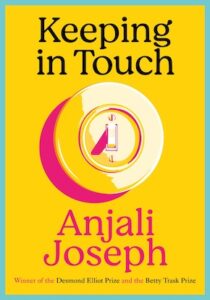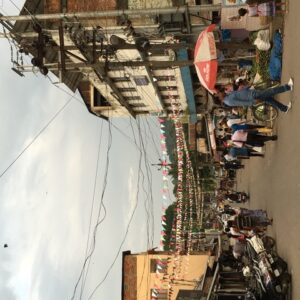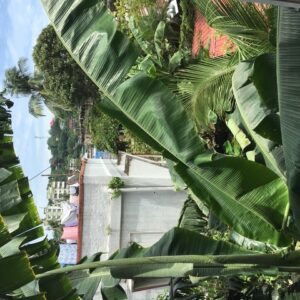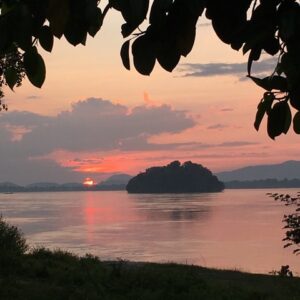Banana tree days
by Anjali JosephRecent cool, damp days remind me of the monsoon in Guwahati, when skies go pearly grey, pensive with rain. In particular, I’ve been thinking of the banana tree just outside my bedroom window in the flat where I spent three years. In humid Guwahati weather, the window was rarely closed, except at night, and often the tree would reach in one flapping green leaf. Depending on the season, and how many storms the leaf had experienced, it was shiny and new, or darker and torn along its veins but still vibrant. Sparrows roosted in the tree, and my friend Sanga, who was my first house guest, visiting from Shillong in neighbouring Meghalaya, warned me it was the sort of tree that attracted spiders. Still I liked to open the windows when I woke up with the light, and very often when I did the banana tree would thrust a friendly frond into my room.
I first visited Guwahati in the winter of 2013, travelling with my friend Veda. At the time, I was living in Norwich, where I’d finished a PhD and was teaching on and off at UEA. But I’d been in Norwich a while, and was wondering where the next move might be. After a writing residence in Shanghai, I’d started learning Mandarin in Norwich. Maybe I’d move to Beijing, where I’d spent a great weekend at the end of the residence? Instead, once in Guwahati, sleepily drinking milkless ‘red tea’ on the wide balcony of a guesthouse in Uzan Bazar, the oldest residential area of the city on the southern bank of the Brahmaputra, I found myself drawn to Assam, a part of India I’d never before visited. The following monsoon, I arrived in Guwahati and set about trying to find a flat in Uzan Bazar. For some reason, I envisaged a flat with turquoise painted walls, and a banana tree outside the kitchen window. A few weeks later, when I saw the apartment that I’d live in for the next three years, I knew it was the one. I moved in with a mattress, a water filter and an electric kettle and, like Ved Ved in Keeping in Touch, the novel I’d go on to write set between Guwahati and London, I started making a home.
For a while, as I taught creative writing online and worked on later drafts of my third novel, The Living, I had no real thought of writing about Assam. I was enamoured of the place, which had its familiar aspects for me, but also so much that was new. Technically, in Assam I was just in another state in India, albeit a long way from the western state of Maharashtra where I’d been born, spent the first seven years of my life and then returned for several years in my twenties. But Assam was, and felt, different. It shared a time zone with Mumbai, which led to absurdities like summer sunrise at 4:30 a.m. (and the sparrows in the banana tree began to get rowdy well before four) and an oddly English winter sunset time of 4:30 p.m. And in the states of the misleadingly dubbed ‘northeast’ of India, the rest of the country was referred to as the ‘mainland’, its inhabitants known with sometimes chilly politeness as ‘Indians’; the mainland government since Independence, after all, has alternated between remoteness and downright hostility in its treatment of communities in the northeast, many of whom have at one time or another sought independence in their turn from Delhi.
The play of remoteness and intimacy, of confusion and learning, became a part of what I came to experience and love in Assamese culture, where irony and paradox are so valued…
In Uzan Bazar, I led a quiet life for the most part, taking evening walks by the Brahmaputra, or sometimes sitting on the sandy beach next to the river with a friend, watching the sun set in a fiery flare behind Umananda, the tiny river island with a temple on top of its hill. I bought vegetables in the bazar, and duck eggs from a magnificent Bodo woman who sat just outside the riverside market, eyeing up potential clientele. I always felt that as I approached she generated in her mind a number that was the amount of money she wanted to make from me that day. After offering me a dozen eggs when I asked for four she’d eventually cross-sell me some spinach or coriander till she got to the magic amount. I made friends. I started learning Assamese, at first from Dimpi, a schoolteacher who also gave evening tuitions, and then from my friend Babu’s grandmother Aita, who had had a long career as a schoolteacher and writer in Jorhat in upper Assam. I learned to cook simple Assamese food, like masor tenga, a genre of fish curry made tart with different types of souring agents: starfruit, lime, orange or tomato among them, or that simplest and most Assamese of dishes, khar, an alkaline preparation made with lentils and a little bit of the ingredient that gives the dish its name, a liquid made by burning a certain type of banana peel and filtering water through the ashes. (Almost every part of the banana tree is used in Assam.) Kharkhowa or ‘khar-eater’ is a way of referring to Assamese people.
… and where the literary and elliptical are among the most favoured modes of expression.”
When I first lived in Assam, I wanted to become a local. The more I learned, the more it became apparent how impossible that would be; but the play of remoteness and intimacy, of confusion and learning, became a part of what I came to experience and love in Assamese culture, where irony and paradox are so valued, and where the literary and elliptical are among the most favoured modes of expression. That dance of distance and approach is also the dynamic of falling in love, and that’s why Keeping in Touch is a story of two protagonists losing touch with and returning to themselves, of lightness that may be hard won but no less light for it, and of course, of love.
 Anjali Joseph is an Indian novelist living in Britain. Her first novel, Saraswati Park, won the Betty Trask Prize, the Desmond Elliott Prize and the Vodafone Crossword Book Award for Fiction. Her work illuminates the inner lives of characters: from a Bombay letter writer to a single mother in a Norwich factory, or the sceptical late-thirties protagonists of her latest novel, Keeping in Touch (Scribe, £14.99), as they navigate a path towards intimacy.
Anjali Joseph is an Indian novelist living in Britain. Her first novel, Saraswati Park, won the Betty Trask Prize, the Desmond Elliott Prize and the Vodafone Crossword Book Award for Fiction. Her work illuminates the inner lives of characters: from a Bombay letter writer to a single mother in a Norwich factory, or the sceptical late-thirties protagonists of her latest novel, Keeping in Touch (Scribe, £14.99), as they navigate a path towards intimacy.
Read more
anjalijoseph.com
instagram.com/anjalijoseph
@anjalijosephbot
@scribeukbooks
Also by Anjali on Bookanista: Wet Cement (March 2016)
“A short novel doesn’t feel obliged to give you all the background. It can be peremptory with the authority of hindsight, even with the gaze of infinity. How much, after all, does anything matter?”
Author portrait © Geraint Lewis
Photographs of Gawahati courtesy Anjali Joseph (click on images to enlarge and view in slideshow)





